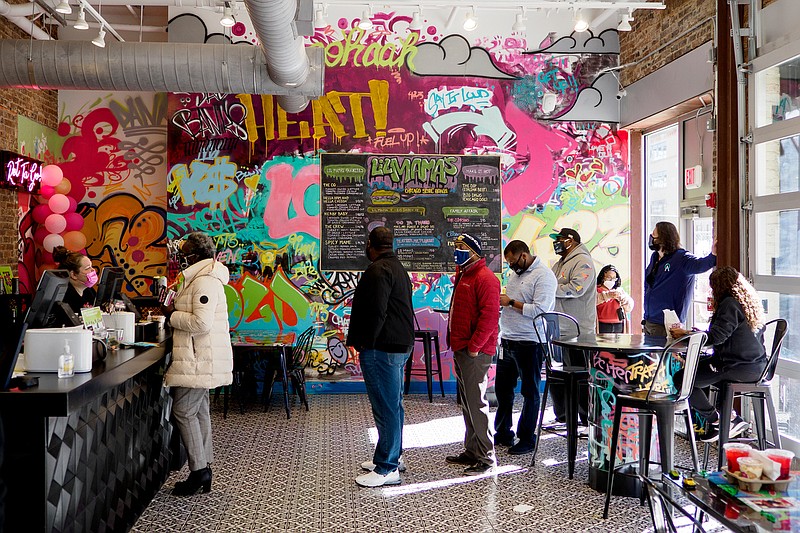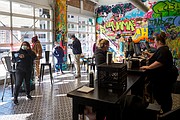Restaurateurs and bars, like many other businesses, operate on tight margins in typical years, so marketing is always a complicated problem. The old saying that you have to spend money to make money is as true in the food and beverage industry as it is elsewhere, operators say.
Just reminding prospective customers that you are there and open can be one key to success, but in today's COVID-19 pandemic world, you also might need to let them know whether you offer limited dine-in seating, take-out and delivery only or take-and-bake options. With limited financial resources for buying media advertising, many eateries and bars have turned to social media and word of mouth for their marketing.
"If you are not on social media, and I can't stand social media, you are literally losing money," said Michael Robinson, co-founder of Proof Incubator in Chattanooga. The incubator works with food and beverage industry people on many levels, including through its Restaurant Recovery Program, which works with up to 20 teams for four weeks on ways to stabilize operations and make it through the pandemic.
Marketing is one of several points of the program's emphasis, along with finance and customer service.
Robinson said a lot of restaurant owners simply don't know or don't have time to learn what tools are available to them. They don't understand social media or how their websites work. Their websites, for example, might have hours that were originally posted eight years ago and the owner doesn't know how to change them. Or the site might not make it clear which services, such as take-out or dine-in, are currently available. Those kinds of inaccuracies can turn people away.
"It's a fatigue factor," Robinson said. "If you are making it hard for people to spend money with you, they are getting tired of dealing with that and are choosing to go elsewhere." The owners and staff are fatigued, too, he said, adding to the overall problem.
Tiffany Banks spent a good deal of time not only perfecting her subs before opening Lil Mama's Chicago Style Hoagy, she did a lot of brand development on social media. She was making the sandwiches in a local commercial kitchen and letting people know where to get them via her posts.
Before opening, she hired Kaelan Byrd to handle media and to communicate regularly with the restaurant's more than 2,200 Instagram and Facebook subscribers.
"She did such a great job laying the groundwork, I'm just continuing what she started," Byrd said.
She also said she believes Facebook and Instagram audiences are different, so she usually does one post for each.
"I added things like standard logos across all platforms and regular postings," Byrd said. "I would post something around 11 a.m. every Thursday to get people thinking about [Lil Mama's] before lunch. We try to tap into our audience and communicate in our brand voice and get people excited."
Elise Armstrong, owner of Black Cat Tap Room on Brainerd Road, uses her Instagram account, which is linked to her Facebook one, to let people know she is open, as well as any specials or new craft beers she offers. More importantly, though, she said she uses it to remind people to support local businesses.
"With social media, I get more traction with posts that are more focused on the human side of things," Armstrong said.
"I post pics of new inventory or beer features and those do well to help inform people, but when it comes to actual numbers, they take off when it is more human. People see I'm not a corporation. I'm a human being who wants to send you home with the best selection of beer."
Most of Armstrong's customers are from the Brainerd neighborhood and come in to get craft beer to take home, she said. She said she usually posts to social media in the afternoon before rush hour in hopes of putting the idea into her customers' heads to stop and pick up new supplies on their way home.
She doesn't spend much time, however, worrying about a plan, or posting at a set time each day.
"I was talking about this the other day with another bar owner, and we agreed that everything is so unpredictable that the strategy to have a strategy is not worth the time," Armstrong said. "It's more or less me constantly reminding people, 'Hey, get your beer here.'
"So, in terms of having a super dialed-in social media angle, no. It's more like, 'Hey, I'm your neighbor and we are all in this together, so come support. It's best to cut the bs and be upfront."
Robinson said the human element is very important, but he cautions against getting into social media discussions with customers over problems whether or not they're related to the restaurant.
"That almost never ends well," he said.
Robinson recommended instead using the platforms to highlight employees or things other restaurants are doing well.
Even more important perhaps is having a 60-, 90- or even 120-day plan, he said.
"I know that is really hard, especially when you are in survival mode," Robinson said. "This thing isn't going anywhere, so a plan going forward is important."
Armstrong said her original goal was to expand and add liquor and food to her place in five years. The pandemic actually has accelerated that to a two-year plan, and she hopes to begin expanding in the coming months.
"I'll be honest, I'm floating through this right now because of my situation going in," Armstrong said. "I have some financial security right now, and it's just me. I don't have employees to worry about, so I keep whittling everythng down to the bare minimum, but I want to take the opportunity considering that things are weird for the next few months and hopefully [get] ready so that next fall, I'll be ready."
Meanwhile, Armstrong said, she'll continue to emphasize buying local and telling people about her own place.
"I tell everybody. These local places are our neighbors and friends," she said.
Contact Barry Courter at bcourter@timesfreepress.com or 423-757-6354.

